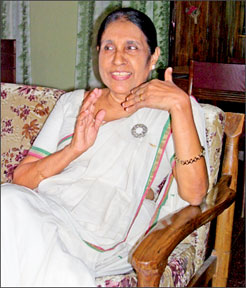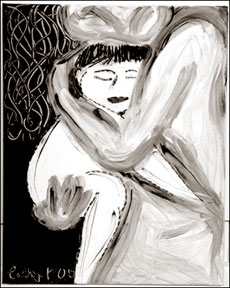Every day is a Mother’s Day
By Samangie Wettimuny
[email protected]
|

Professor emeritus Kusuma Karunaratna
|
Unconditional motherly love has always been a major source of
inspiration for the great writers. It has made many a poet compose
masterpieces. Songs written on unlimited motherly love are so appealing
and listeners will never get tired of them. Portraits and drawings which
depict the mother-child relationship have always been pleasing to the
eye.
Mother’s Day will be celebrated today (Mother’s Day is usually
celebrated on the second Sunday of May.) in most of the countries across
the world and children will pay homage to their mothers with flowers and
gifts in recognition of mothers’ contribution in their lives to say
‘thank you’ for her unconditional love!
Though the concept of celebrating a Mother’s Day in honour of her
immense contribution to the betterment of the society emerged in the
West (See Box), it has become increasingly popular in most parts of the
world now. However even in the West the concept was never motivated by
commercial factors at its initial stage.
Anyway mainly in a country like Sri Lanka where the role of mother is
always upheld with utmost respect, do we need to have a separate day to
pay homage to her unconditional love? Is not every day a mother’s day?
 Mother’s day is gradually becoming an occasion mainly of the business
sector and certain media organisations. According to eminent Professor
emeritus Kusuma Karunaratna a Mother’s day is quite an unnecessary
celebration in a country like Sri Lanka which has a great culture
largely enriched by Buddhism. Mother’s day is gradually becoming an occasion mainly of the business
sector and certain media organisations. According to eminent Professor
emeritus Kusuma Karunaratna a Mother’s day is quite an unnecessary
celebration in a country like Sri Lanka which has a great culture
largely enriched by Buddhism.
“As a nation we have a great regard for motherhood. Actually it is a
part of our culture. The mother-child relationship has always been
strong and inseparable. So we do not need a separate day to pay homage
to mother.”
The former Acting Vice Chancellor, Ex-Dean of the Faculty of Graduate
Studies and the former Head of the Department of Sinhala , University of
Colombo further added that the situation is different in the West.
Over there the mother-child relationship does not stay too long as
most of the children tend to leave their homes to live separately at an
early age like 15 or so. Since the practice has been the order of the
day, children in the West do ‘actually need a day or two to pay their
respects to their parents.
“Then they will go to wherever their mothers live either to the
apartment or to the elders’ home may be with a rose or two to show them
what a lot a mother means to them.”
In the past the extended family system was common in Sri Lanka.
Children used to live with their parents even after marriage and as a
result they were always closely attached to their parents. But the
situation has gradually changed with urbanization. As people started
moving to the city in their quest of employment, they had to leave their
old parents in the villages.
“But it is happy to note that majority of children still hold on to
the traditional view. Since they never fail to visit their parents
whenever they can, they do not need a Mother’s Day.
When asked of the changing social pattern with the gradual emergence
of elders’ homes, Professor Karunaratna noted that it is because not all
the children are alike. “There is also a sector of children who have
neglected their old parents completely. Anyway it is difficult to give a
generalisation as still the majority of children are fully aware of
their responsibilities.”
The concept is mainly promoted through certain media channels and
business sector. “They try their best to make it a special occasion as
it is they who will be benefitted from it in the end”
Motherhood is treated with utmost respect in almost all the
religions. The Buddha has emphasized that a person has no one else
worthy of honour and respect as his/her mother. Mother is always given
the priority when referring to the parental pair. The close relationship
between mother and her offspring is often highlighted. “Mother is the
best of friends,best of relatives and best of elders.”
It is also mentioned in the Buddhist literature that when asked “who
is the best friend one has at home?” The Buddha had replied “The mother
is the best friend one has at home.”
Also when referring to the Sangha the Buddha had preached to them
that the Sangha should always try to protect their virtues just like the
mother who protects her own child even at the expense of her life
How the Mother’s Day originated
The Concept of Mother’s day is believed to have originated several
centuries ago. Spring celebrations of Ancient Greece in honour of Rhea,
the mother of gods marks its beginning.
During the 1600s, the early Christians in England had celebrated a
day to pay reverence to Mother Mary. Later by a religious order the day
was named as the Mothering day, also widening its scope to include all
mothers and it was celebrated on the 4th Sunday of Lent (the forty day
period leading upto Easter.)
In fact the day was then celebrated in honour of all the mothers.
Since most of the England’s poor worked as servants of the wealthy, they
had to stay in the houses of their masters. But on Mothering Day
servants were allowed to go to their homes to spend the day with their
mothers.
With the propagation of Christianity, the celebration changed to
honour the “Mother church” - the spiritual power that gave them life and
protected them from destruction. As the years passed, the church
festival blended with the Mothering Sunday celebration. People then
began to honour their mothers and the church.
In the U.S.A the concept of Mother’s Day was first suggested by
social activist, Julia Ward Howe. Shocked by the destruction caused by
the American Civil war and the Franco-Prussian war, she appealed to war
mothers the women who supported their husbands and sons of war.
In the Boston Mass she initiated a Mother’s peace day observance on
the second Sunday in June and for nearly ten years it existed as an
annual event. Though she failed in her attempt to get the formal
recognition of a Mother’s Day for peace, her dedication is largely
appreciated.
Howe’s views were also influenced by Ann Marie Reeves Javis. Javis
was working to assist in the healing of the nation after the civil war.
In the U.S.A. it was Anna Jarvis, Jarvis’ daughter who finally
succeeded in introducing Mother’s day which we celebrate up to this
date. As she felt that children often fail to appreciate their mothers
enough while the mother was still alive, she was determined to introduce
a Mother’s Day which would increase respect for parents.
Finally in 1912 the day was officially declared a holiday. Second
Sunday of May was named as the Mother’s Day. In 1914, President Woodrow
Wilson made the first official statement proclaiming Mother’s Day as a
national holiday.
Ironically, as the holiday became quite commercialised in later
years, the founder herself became a major opponent of what the holiday
had become. |
